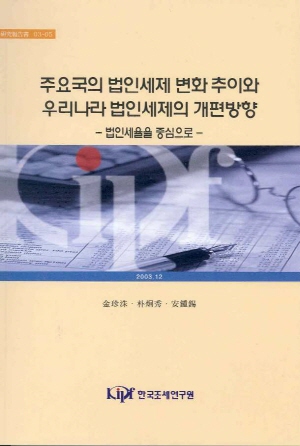주요국의 법인세제 변화추이와 우리나라
-법인세제의 개편방향-
- Keyword
- 법인세, 법인세, 법인세인하, 기업, 법인세인하, 기업
- Title
- 주요국의 법인세제 변화추이와 우리나라
-법인세제의 개편방향-
Corporate Tax Rate Policy: Recent Trends and its Economic Effects
- Authors
- 김진수; Jin Soo Kim; Hyung-soo Park; Jongseok An; 박형수; 안종석; Jin Soo Kim; Jongseok An; Hyung-soo Park
- Issue Date
- 2003-12-01
2003-12-01
- Publisher
- KIPF
KIPF
- Page
- pp. 173
pp. 173
- Abstract
- 2005년부터 법인세 최고세율이 27%에서 25%로 2%p 낮아진다. 그러나 아직도 우리나라의 법인세율은 국제 자본시장에서 주요 경쟁상대가 되는 동남아시아 지역의 다른 국가들에 비해 상당히 높은 수준이며, 한편에서는 근본적 세제개혁(fundamental tax reform)이라는 관점에서 법인세제 자체의 존재 의의에 대해 회의를 표시하고 있어 장기적인 관점에서 법인세율 인하에 대한 논의는 지속될 것으로 보인다. 뿐만 아니라 2005년부터 시행될 새로운 조치의 경제적 효과를 면밀하게 분석해 볼 필요도 있다. 이러한 관점에서 본 연구에서는 법인세율 인하의 경제적 효과를 분석하고 향후 정책시사점을 모색하였다.
본 연구의 결과를 간략하게 요약하면 다음과 같다.
첫째, 우리나라 법인세부담은 국제자본시장에서 경쟁대상이 되는 주변 국가들에 비해 상당히 높은 편이며, 명목 법인세율 인하는 기업의 투자결정에서 핵심적인 역할을 하는 한계유효세부담을 인하하는 효과가 있다.
둘째, 감가상각제도 등 다른 제도를 그대로 둔 채 법인세율 인하만으로 실질적인 세부담을 주변 경쟁국들 수준으로 인하하려면 명목세율을 대폭적으로 인하하여 20% 수준 또는 그 이하로 만들어야 한다.
셋째, 기업의 세부담 인하는 중장기적으로 투자를 증가시키며, 경제성장률을 제고하는 효과가 있다.
넷째, 그러나 단기적으로 부담해야 하는 법인세율 인하에 따른 재정적인 부담은 상당히 크다.
이와 같은 연구결과를 종합해 볼 때 중장기적으로 투자를 촉진하여 성장잠재력을 제고하려면 법인세율을 인하할 필요가 있다는 결론을 도출할 수 있다. 그러나 이와 같은 정책을 추진하는 데는 몇 가지 주의해야 할 점이 있는데, 그 중 가장 중요한 것은 조세정책의 개편은 재정정책의 변화와 함께 고려하여야 한다는 점이다. 외국이나 우리나라의 실증분석 결과들을 보면 법인세율 인하로 인한 세입감소를 보충하는 방법에 따라 법인세율 인하가 경제성장을 저해하는 결과를 초래할 수도 있는 것으로 나타났다. 또한 법인세율 인하정책을 수행할 때는 그 시기 선택에 있어 신중을 기할 필요가 있다. 조세 이외의 여러 가지 정치?경제적 요인으로 인해 단기적으로 투자가 기대 수익률에 대해 비탄력적인 경우 법인세율 인하는 투자촉진 효과를 발휘하지 못하면서 기존 투자에 대한 세부담 경감으로 인한 세수감소만을 초래할 뿐이다.
The corporate tax rate in Korea is relatively lower than those in major capital exporting countries but higher than those in East Asian countries. From the beginning of 2005, the corporate tax rate in Korea is scheduled to decrease by 2 percent point. But the total tax rate including local tax is going to be 27.5 %, which is still higher than those prevailed in other developing countries in East Asia.
In this research, we investigate recent trends of policies on corporate tax rate not only in advanced countries but also in developing countries, compare the effective tax burden of firms in Korea with that of firms in other East Asian countries, and also analyze the effects of changes in tax burden on investment, economic growth, and government revenue. The results can be summarized as follows.
First, the effective tax burden of firms in Korea is higher than that of firms in other East Asian countries and the decrease in statutory tax rate reduces the effective tax burden.
Second, if the government would like to reduce the effective tax burden to the level prevailed in other East Asian countries, the statutory tax rate should be equal to or lower than 20% under the current depreciation and other corporate tax rules.
Third, the alleviation of tax burden increases investment in the long run and accelerates economic growth.
Lastly, the fiscal burden followed by the tax cut might be considerably large in the short run.
One of the most important policy implications of the research is that, in order to promote investment and improve economic potentials, there should be a sharp decrease in the corporate tax rate. However, the government should be very cautious in performing tax cut. The tax cut policy should be accompanied by other measures to increase revenue or decrease expenditure maintain the fiscal sustainability. In addition, one should note that tax cut policy might not increase investment unless the investment be elastic with respect to the after-tax rate of return.
,
- Keywords
- 법인세, 법인세, 법인세인하, 기업, 법인세인하, 기업
